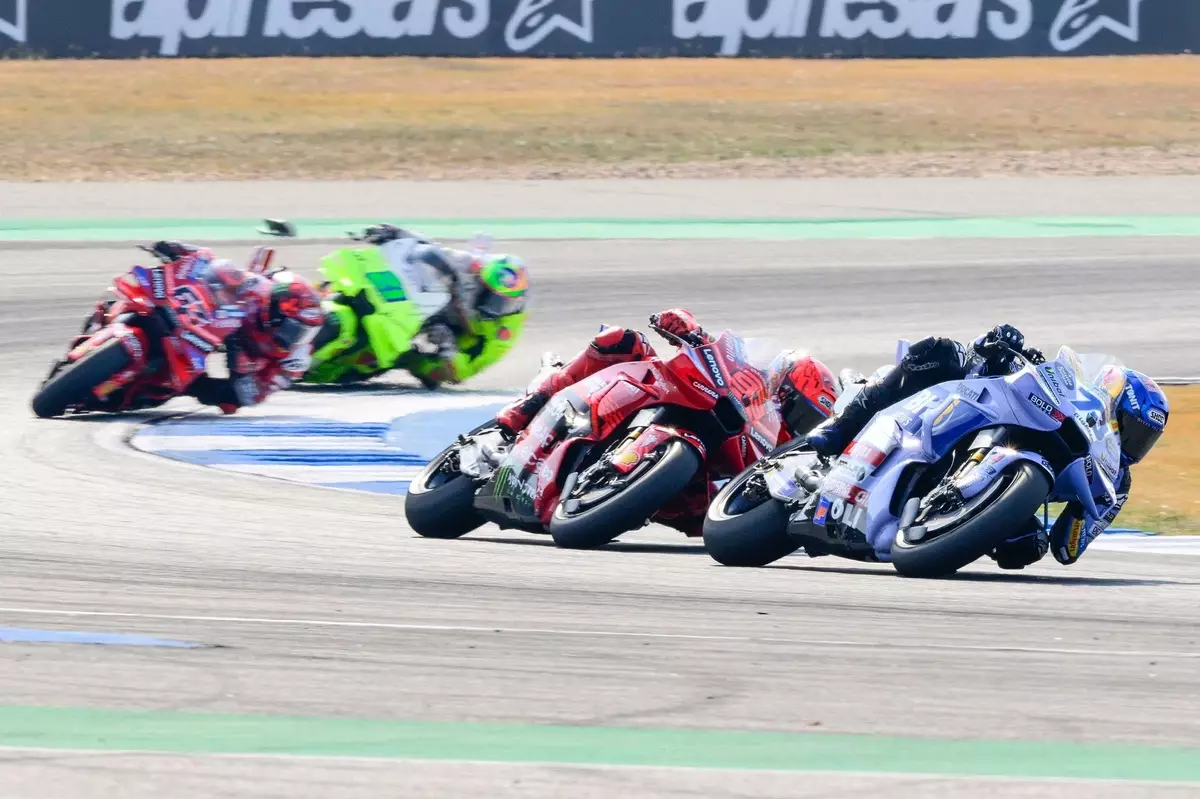The MotoGP season is often as much about mental strategy and psychological maneuvering as it is about raw speed. The recent Thailand Grand Prix showcased this theory, especially with the performance of Marc Marquez, who illustrated the intricate balance between risk and reward in high-stakes racing. As this exciting race unfolded, it became apparent that Marquez wasn’t just racing his motorcycle; he was playing a tactical game that kept his competitors guessing and showcased a deeper understanding of race dynamics.
Marc Marquez, a seasoned competitor with a reputation for both skill and cunning, demonstrated his unique racing philosophy during the opening round of the 2025 MotoGP season in Buriram. Surprisingly, despite initially taking the lead and appearing dominant, Marquez purposefully slowed his pace early in the race, only to regain control at critical moments. This behavior led Francesco Bagnaia, his competitor and fellow Ducati rider, to claim that Marquez was “playing with us.” This statement highlights the surface-level skepticism regarding Marquez’s strategies; Bagnaia believed that Marquez possessed more speed than he was exhibiting, implying a deliberate psychological tactic to maintain control over his rivals.
This tactic raises essential questions about the broader implications of racing strategy. For Marquez, it was not merely about achieving the fastest lap times but rather about creating a narrative that kept his competitors from feeling secure. By managing his tire pressure and pace, he ensured that he could dominate when necessary while observing how his adversaries reacted under pressure, a true demonstration of the chess-like nature of racing.
Francesco Bagnaia’s reactions throughout the race further illustrate the psychological warfare inherent in MotoGP racing. He openly expressed his frustrations, noting that his attempts to catch the Marquez brothers were thwarted by his own issues with tire management and front-end grip. “I tried but it was like in the cinema,” he lamented, suggesting that he felt like an observer rather than an active participant. Bagnaia’s perspective here serves as a window into the relentless pressure that competitors experience, intricately tied to both their performance and their rivals’ strategies.
The assertion that Marquez was toying with them was not just an expression of frustration but also an acknowledgment of Marquez’s uncanny ability to manipulate race flow. In the closing laps, Marquez effortlessly stretched his lead, clocking faster lap times and showcasing a clear distinction in pace. This contrast in performance highlighted Bagnaia’s need to refine his approach and learn from Marquez’s evident mastery over race conditions, especially as the two prepare for the subsequent races.
Bagnaia’s finish in third place—2.3 seconds behind Marquez—sounded a cautionary note for him. While he recognized it as a necessary exercise in damage limitation following the inconsistent performance that cost him the championship in 2024, he emphasized that he was not satisfied with merely standing on the podium. “I will never sign up for third place,” he declared, reflecting the competitive spirit that drives top athletes. It signals his understanding that improving performance hinges not just on physical ability but also on controlling the psychological aspects of racing, including risk management and consistent lap performance.
His candid admissions serve as reminders that MotoGP racing is as much about mental resilience as it is about technical skill. Success hinges on the capacity to adapt, learn quickly, and push beyond current limitations. For Bagnaia, the Thailand Grand Prix was not a final outcome but a critical learning opportunity. He recognized that every race presents its own set of challenges, and he must use these experiences to fuel his ambition—his goal obvious: seize victory in subsequent races.
As the MotoGP season progresses, the Thailand Grand Prix offers a wealth of insights into the sport’s nuanced nature. The strategies employed by formidable competitors like Marc Marquez exemplify the psychological warfare on the track, while Bagnaia’s determination to improve and compete for top positions underlines a vital component of racing culture. For both riders, the challenge extends beyond the race itself and into the realm of mental fortitude and tactical adaptability. With each race, lessons are learned, rivalries are intensified, and the quest for supremacy continues, promising an exhilarating season ahead.


Leave a Reply